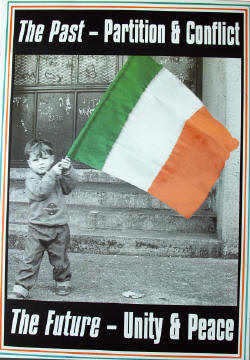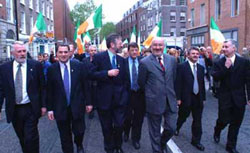 |
Irisch
Republikanische Solidarität
|
 |
UUP feud mediation efforts at an end
Amid speculation that the British government could be ready to finally
allow the North's Assembly election to proceed in October, David
Trimble's Ulster Unionist Party has again descended into a legal
quagmire over the party's simmering internal feud.
Demands for another showdown meeting of the UUP's 900-member ruling
council between Trimble's supporters and a group of rival hardliners is
now in the hands of lawyers.
Jeffrey Donaldson, David Burnside and Martin Smyth are currently facing
expulsion from the UUP. Supporters have now requested a meeting of the
party's governing body over attempts to discipline the three, who were
suspended after resigning the party whip and calling for David
Trimble's resignation.
In a previous meeting last month -- the tenth showdown since the Good
Friday Agreement was signed -- Jeffrey Donaldson had demanded the party
also reject the British and Irish governments' Joint Declaration for
implementing the 1998 Good Friday Agreement. His motion failed by the
usual margin of some 60-70 delegates, and Trimble's leadership was
strengthened.
UUP officers last night delayed setting the date for another meeting of
the ruling council until the legal basis for the latest challenge could
be investigated.
Trimble has already made his position clear, describing the three
recalcitrant MPs as effectively already resigned. However, the decision
by the hardliners to press ahead with yet another showdown suggests
that efforts by senior members of the party to bridge the gap between
Trimble and malcontents have already floundered.
All of the other political parties in the North of Ireland have
implored the British government to allow the elections it has already
cancelled twice this year, and overcome its seeming obsession with the
inner workings of the UUP.
It is now reported that Dublin's Foreign Affairs Minister Brian Cowen
will meet the British Secretary of State, Paul Murphy, early next month
under the inter-governmental council and that the meeting could clear
the way for fresh elections to the Belfast Assembly. However, few
pundits have dared to predict the British government's actions since it
apparently stopped acting in its self-interest earlier this year.
Meanwhile, in a telling criticism this week, journalist and author
Susan McKay has accused unionism's political leadership of being "very
short on ideas for governing in peacetime". McKay accused unionist
politicians of perpetuating a sense of fear and terror in the
Protestant population about the IRA while privately admitting that the
IRA is not a threat.
McKay said unionist politicians deliberately frightened their
constituents into being loyal. The heightening of irrational fears and
the fiery rhetoric adopted by some politicians directly fed unionist
violence. The relationship between the extreme and the mainstream is
crucial to understanding contemporary unionism, said McKay.
But the unionist perception must be understood not only in terms of
what is said but also in terms of what is not. As a journalist, McKay
said she spent a lot of time reporting things people claim haven't
happened.
Denials, lies and silence about unionist violence within the unionist
community have had a damaging and distorting effect on unionist
perception and decision-making process, she suggested.
Letzte Änderung:
06-Sept-03